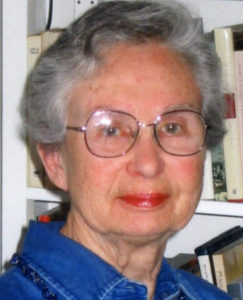Calendar of Events
Note: Meetings are usually held on the second Sunday of each month, September through May, from 2:00 to 4:00 p.m. Currently we are meeting via Zoom, but in-person meetings are held at the Bethesda-Chevy Chase Services Center, 4805 Edgemoor Lane, Bethesda, Maryland, and occasionally at other venues. The meetings are open to anyone. However, certain meetings may require a fee.

- This event has passed.
Native American Gifts: Wild Rice and Maple Syrup
January 12, 2020 @ 2:00 pm - 4:00 pm

After receiving her Master’s degree in Sociology from the University of Wisconsin-Madison, Shirley Cherkasky moved to the Washington area with her family in 1966 and worked as a research sociologist at the George Washington University for five years. Prior to her work at Smithsonian’s National Museum of American History, Shirley served as Project Director of the “Old Ways in the New World” section of the Smithsonian’s Bicentennial Festival of American Folklife (1973-1976). As coordinator of exhibition-related public programs for the Smithsonian’s National Museum of American History, Shirley Cherkasky discovered the existence of culinary historian groups in Boston, Ann Arbor, and Houston when she began planning a symposium, “Good as Gold: Foods the Americas Gave the World,” to mark the observance of the Columbian Quincentenary in 1992. She promptly joined the Boston group and found it a source of so much interesting information and fun that she determined to start a similar group in the Washington, D.C., area.
After retiring in 1995 she followed up on that plan in October 1996, and the Culinary Historians of Washington, D.C. has been in existence ever since. Currently Shirley coordinates CHoW’s collectionof books for the Culinary Historians of Washington’s Culinary History Collection in the Smithsonian Libraries and also coordinates CHoW’s contributions of product cookbooks to the important Warshaw Collection of Business Americana in the American History Museum’s Archives. For more than 25 years she was an active member of the International Commission on Ethnological Food Research, attending meetings and occasionally giving papers.
“Native American Gifts…” was originally presented at the group’s meeting in Heidelberg, Germany, in 2016. In the 17th century when Europeans encountered Native Americans in the Great Lakes region, they learned of two wild foods that were staples of the Indian diet: wild rice and maple syrup, harvested by the Indians and labor-intensively processed. The cold, heavily wooded Upper Midwest was dotted with thousands of shallow lakes that had been scooped out by receding glaciers, and wild rice grew there profusely. By the mid-19th century the new American government encouraged European settlers to move into the area and forced the Indians into special reserved areas, many of which included wild rice lakes where the Indians continued to harvest and process rice traditionally. It remained primarily an Indian food, harvested to survive the winters when other foodstuffs were scarce. Finding sugar maples on their new farmsteads, settlers learned to produce syrup and sell it. Becoming so popular in the northern U.S., it prompted commercial efforts to find cheaper substitutes. Today supermarket shelves are filled with myriad brands of “pancake syrup” that compete successfully with authentic maple syrup. In the 1960s a form of wild rice was developed that could be cultivated in clay paddies and harvested mechanically. Costs dropped dramatically and extensive marketing followed. Currently, at least ninety percent of all wild rice is produced and marketed by non-Indians.